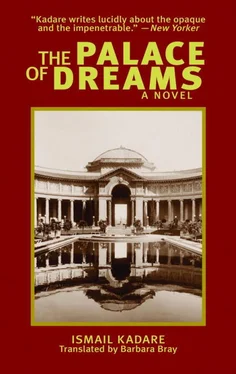The footmen were serving raki in silver goblets. Through the buzz of talk Mark-Alem tried to hear what Uncle Kurt and the Austrian were saying in French. After downing a glass of raki in one gulp, he felt a wave of euphoria. When, after a moment, his eyes met those of his mother, he quickly looked away. She seemed to be saying, “What was all that nonsense you were telling me just now?”
The entrance of the Vizier immediately struck a chill into the atmosphere. This wasn’t so much because of his gloomy expression—most of those present were accustomed to that—as because he also looked preoccupied and gazed at his guests as if he were surprised to see them there and were waiting for them to tell him why they had come. After saying good evening he stood by one of the braziers, holding his hands spread over it to warm them. To Mark-Alem the rings around his eyes looked even darker than on the evening of their memorable dinner.
Kurt, evidently feeling it was up to him to try to restore an air of normality to the proceedings, went over to his brother and whispered a few words which Mark-Alem couldn’t hear. But they must have had to do with the Austrian, for the Vizier replied to Kurt and the other young man at the same time, and the Austrian nodded respectfully as Kurt translated his brother’s words. After this, things did seem a little more relaxed. The guests began to converse in pairs, while the Austrian went on talking to the Vizier with Kurt still acting as interpreter. Mark-Alem was tempted to move nearer to listen, but one of his cousins, the bald one who’d had supper with them the day before Mark-Alem started work in the Palace of Dreams, asked in a whisper:
“How are you getting on at the Tabir?”
“Very well,” said Mark-Alem, though his mouth turned down at the corners to indicate only “So-so.”
“Are you working in Interpretation?”
He nodded. A gleam of irony came into his cousin’s expression, but Mark-Alem didn’t care. He had eyes for no one but his favorite uncle, Kurt. He’d never seen him looking so handsome and elegant, in his immaculate white starched collar which cast a magical glow over his face. Mark-Alem was soon convinced that the mainspring of the whole evening was Kurt, who had had the strange idea of inviting the Albanian rhapsodists. Mark-Alem was eager to hear at last the Albanian version of the family epic, until now as unknown to them as the other side of the moon.
Someone who was evidently the last of the guests now entered, apologizing for his late arrival:
“There’s a certain amount of unusual activity outside,” he said. “The forces of law and order are checking people’s identity.”
Some of the guests tried to catch the Vizier’s eye, but he seemed quite unaffected by the latecomer’s words. He must know what’s going on, thought Mark-Alem. Otherwise he wouldn’t take the news with such indifference. The Vizier didn’t seem to have noticed his nephew either; it was as if he’d completely forgotten the disjointed conversation they’d had that evening a few weeks before. Only an hour ago Mark-Alem had been wondering whether he oughtn’t to tell the Vizier what had happened at the Tabir Sarrail. Hadn’t the moment come for him to be on his guard? But now, seeing his uncle so unconcerned, Mark-Alem felt reassured too.
That being so, he began to examine the patterns in the huge Persian carpet, the largest and most beautiful he’d ever seen, a birthday present to the Vizier from the Sovereign. It was one of the few things that still seemed to him as lovely as ever, though since he’d started working in the Palace of Dreams the rest of the world had grown pale and dull.
He only raised his eyes from the carpet when he realized that everyone had suddenly fallen silent. The Vizier was preparing to speak. He told his guests that they were about to hear the rhapsodists from Albania; then, during and after dinner, as was the custom, the Slav rhapsodists would sing passages from the Quprili epic.
“Show them in,” he told the majordomo.
After a while the rhapsodists entered, amid a complete silence. There were three of them, dressed in typical native costume. Two of them were middle-aged, one of them slightly younger, and each was carrying his fragile stringed instrument. Mark-Alem’s attention was immediately captured by these instruments— lahutas, as they were called. They were very like the guslas of the Slav rhapsodists, and Mark-Alem felt the same surprise, not to say disappointment, as he’d experienced when he first saw the guslas. Having heard so much about the famous epic, he’d imagined that the instruments accompanying it would somehow be as strange, weighty, majestic, and imposing as the chant itself, and that the rhapsodists would have to drag them along behind them. But the gusla was merely a simple wooden instrument with a single string, and could easily be carried in one hand. It had seemed incredible that this wretched thing could bring the vast ancient epic to life. And now Mark-Alem had seen the lahuta, his disappointment was even more acute. Ever since he’d heard Kurt talking about the Albanian version of their epic, he’d for some reason thought the Albanian lahuta would cure the shock that the gusla had administered to his imagination. He’d expected it to be not only heavy and impressive but also steeped in the blood he associated in his mind with the cruelty of their epic. But it had turned out to be as rudimentary as the gusla —just a wooden sounding box with an opening on top and one solitary string.
By now the rhapsodists were standing between the two groups into which the guests had of their own accord divided themselves. The bards had fair hair, and their bright eyes seemed to express not so much scorn as complete rejection of anything that might be offered them.
The footmen had served them raki in the same kind of silver goblets as those they’d handed round to the other guests, but the Albanians merely touched them with their lips.
“Well, you can begin,” said the Vizier in Albanian.
One of the rhapsodists sat down on a stool which the majordomo had brought. He laid his lahuta on his lap, then sat for a moment looking at the string. Then he lifted his bow in his right hand and laid it across the string. The first sounds were faint and monotonous, tending obstinately back to their point of departure. It was like a long, too long, stifling lament. If it goes on like this, thought Mark-Alem, everyone will be gasping for air. When was the fellow going to start on the words? Everyone else was obviously wondering the same thing. This kind of music needed to be padded with words; otherwise this string would scrape their souls raw.
When the rhapsodist finally opened his mouth and began to sing, Mark-Alem was at first relieved. But there was something inhuman about the man’s voice, too. It was as if some strange operation had been performed on it, removing all everyday tones and leaving only eternal ones. It was a voice in which the throat of man and the throat of the mountains seemed, over ages, to have attuned themselves to one another and merged. And so with other voices, ever more distant, until they all joined in the lament of the stars. Words and voice alike might as easily have come from the mouth of the dead as of the living. Another accord—the closest and the most perfect—had been made with the shades of the dead.
Mark-Alem couldn’t take his eyes off the slender, solitary string stretched across the sounding box. It was the string that secreted the lament; the box amplified it to terrifying proportions. Suddenly it was revealed to Mark-Alem that this hollow cage was the breast containing the soul of the nation to which he belonged. It was from there that the vibrant age-old lament arose. He’d already heard fragments of it; only today would he be permitted to hear the whole. He now felt the hollow of the lahuta inside his own breast.
Читать дальше












